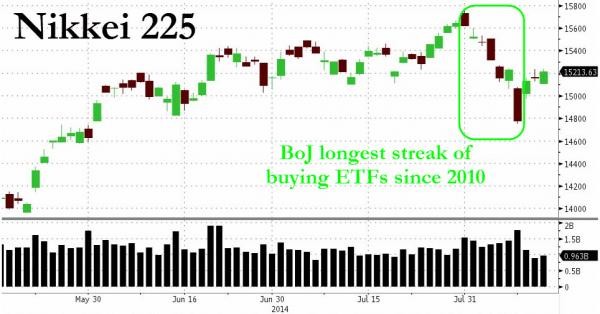While the mainstream media has become used to the daily buying of bonds by The Fed, mention that they are buying ‘stocks’ and suddenly one is labeled a conspiracy theory wonk - despite 1) the fact that they are, and 2) they have admitted that equity wealth creation is a policy tool. However, ignoring the almost daily vertical ramps in US stocks and volatility from a seemingly bottomless pit of margin; the Bank of Japan has been buying stocks (directly through ETFs) for years… and as the Nikkei began to turn down in early August, the WSJ reports the BoJ undertook the longest and largest consecutive buying streak since it started purchasing ETFs in December 2010.

Â
While the central bank is well known for its massive purchases of Japanese government bonds as a part of its monetary easing program, it also buys ETFs—albeit in much smaller quantities—that track the Nikkei Stock Average and the broader Topix index.
Through a trustee, the central bank purchased a combined Â¥92.4 billion ($904.2 million) in ETFs over the first six business days of August. That’s the BOJ’s longest and largest consecutive buying streak since it started purchasing ETFs in December 2010.
Many traders suspect that it may not be a coincidence that the central bank is scooping up ETFs at a time when both the Nikkei and the Topix are spending considerable amounts of time in negative territory. Speculation is rife that the BOJ is following an unwritten rule, called “the 1% rule” by traders, where it buys ETFs after the Topix index falls around 1% in the morning session.
“The current ‘Abenomics’ experiment could come tumbling down if political support erodes, so the collusive impact of both efforts is critical to keep the ship both afloat and on course,” he added.
The only problem… it is not sustainable…
But some analysts are skeptical about how effective the BOJ’s ETF purchases will be in the long term.
“The BOJ can only support the bottom, but stock valuations can only be raised by the values of each company,” said Takahiro Sekido, a strategist at the Bank of Tokyo-Mitsubishi UFJ. He added sharp rises in domestic shares are unlikely unless investors are able to see improvements in business conditions in the years ahead.

